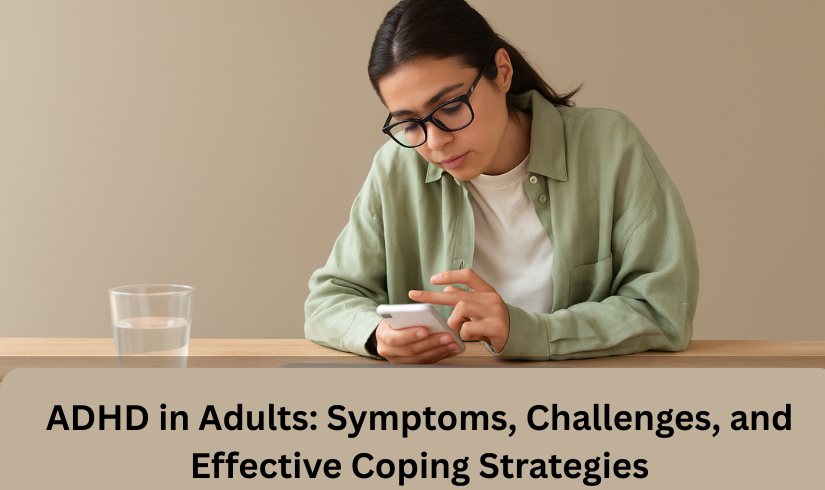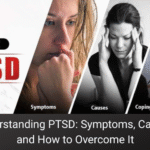
ADHD in Adults: Symptoms, Challenges,
and Effective Coping Strategies
Struggling with ADHD? Whether you’re an adult or a teenager, learn about symptoms,
challenges, and practical strategies to manage ADHD successfully through therapy, medication,
and lifestyle changes.
When we hear about Attention-Deficit/Hyperactivity Disorder (ADHD), we often think of
energetic children who can’t sit still. But ADHD isn’t just a childhood issue. For many people, the
symptoms continue well into adulthood, affecting everything from work and relationships to
everyday responsibilities. Adult ADHD tends to show up differently than in kids — adults usually
struggle more with focus, impulsive decisions, and managing emotions.
In this article, we’ll break down what ADHD looks like in adults, how it impacts daily life, and the
different ways to manage it effectively.
What is ADHD in Adults?
ADHD is a neurodevelopmental disorder that affects how the brain controls attention,
behavior, and emotions. It mainly impacts what experts call “executive functions” — things like
planning, organizing, remembering, and controlling impulses.
While some children with ADHD may see their symptoms lessen over time, research shows
that around 60% carry those symptoms into adulthood.
Unfortunately, many adults don’t even realize they have ADHD. They might just think they are
lazy, disorganized, or forgetful, without knowing there’s an underlying condition causing those
challenges. The truth might be farther from your speculations. It is advisable to seek a
professional psychologist or therapist.
Seeking help doesn’t make you weak, going to a professional (especially mental health issues
related) does not make you crazy. Your mental health is equally vital as your physical health.
Sometimes mental health issues may manifest into physical health issues, hence, a proper care
to both is necessary.
Common Symptoms of ADHD in Adults
Symptoms can vary from person to person, but here are some of the most common signs:
● Inattention
Adults may find it hard to stay focused, often making careless mistakes or being easily
distracted.
● Impulsivity
Acting quickly without thinking things through, interrupting conversations, or making
rash decisions.
● Disorganization
Trouble managing time, missing deadlines, forgetting appointments, or feeling
overwhelmed by daily tasks.
● Emotional Struggles
Quick mood changes, irritability, and getting frustrated over small things are common.
● Hyperactivity (Less Obvious in Adults)
Instead of running around like children, adults may feel restless inside, like they
constantly need to be doing something.
Challenges Adults with ADHD Often Face
Living with untreated or undiagnosed ADHD can create problems across different parts of life:
- Work and Career
● Difficulty meeting deadlines.
● Jumping from one job to another due to boredom or dissatisfaction.
● Trouble staying organized and focused during long projects or meetings. - Relationships
● Forgetting important events or dates like anniversaries or birthdays.
● Difficulty following conversations, leading to misunderstandings.
● Saying things impulsively that might hurt others without meaning to. - Daily Life
● Struggling to maintain a consistent routine.
● Financial difficulties due to impulsive spending.
● Challenges balancing work, family, and personal responsibilities.
How to Manage ADHD as an Adult
The good news is that with the right support, managing ADHD is very possible. Here’s how:
- Seek Professional Help
Getting a proper diagnosis from a doctor, psychiatrist, or psychologist is the first step. Treatment
options often include:
● Medication
Stimulant and non-stimulant medicines can help regulate brain chemicals linked to
focus and self-control.
● Therapy
Cognitive Behavioral Therapy (CBT) can teach skills like organizing thoughts, managing
impulsivity, and handling emotional challenges. - Build Better Organization Habits
● Use a planner, notebook, or smartphone app to track tasks and deadlines.
● Break larger tasks into smaller, manageable steps.
● Set reminders for important events or tasks so nothing slips through the cracks. - Improve Time Management
● Assign specific time blocks for each task to stay focused.
● Tackle important or urgent tasks first.
● Use timers to help you stick to your schedule without getting lost in distractions. - Adopt Healthy Daily Routines
● Exercise Regularly
Physical activity improves concentration, mood, and reduces restlessness.
● Get Enough Sleep
A consistent sleep schedule helps improve focus and emotional stability.
● Eat Nutritious Foods
A balanced diet with whole grains, fruits, vegetables, and lean proteins supports better
brain function.
- Manage Emotions Better
● Practice mindfulness, deep breathing, or meditation to calm racing thoughts.
● Find hobbies that relax and engage you, like painting, gardening, or playing an
instrument.
● Talk openly with close friends or family members about how ADHD affects you, so they
can offer understanding and support.
The Role of Brain Chemistry in ADHD
Research shows that ADHD is linked to differences in brain structure and neurotransmitter
activity, particularly involving dopamine and norepinephrine. These chemicals play a key role in
attention, motivation, and emotional regulation. Understanding the neurological basis of ADHD
helps explain why treatment often includes medications that balance these brain chemicals,
alongside behavioral therapies to strengthen focus, impulse control, and emotional resilience in
daily life.
Frequently Asked Questions (FAQs) - Can ADHD develop in adulthood?
ADHD doesn’t suddenly develop in adulthood. It usually starts in childhood, but symptoms may
only become obvious when adult responsibilities increase. - What happens if adult ADHD goes untreated?
Untreated ADHD can lead to serious problems, such as job loss, financial trouble, relationship
difficulties, and mental health issues like anxiety or depression. - Are there natural ways to manage ADHD symptoms?
Yes. Exercise, mindfulness practices, structured routines, and healthy eating can all help
manage symptoms, although they might not replace medication or therapy for everyone. - Can adults with ADHD still be successful?
Absolutely. Many adults with ADHD go on to have very successful lives. They often bring
creativity, energy, and resilience to the table. With the right support and strategies, success is
more than possible.
ADHD in adults can be challenging, but it doesn’t have to define your life. By understanding the
symptoms and seeking the right treatment and support, adults with ADHD can thrive both
personally and professionally. Building healthy habits, staying organized, and working with
professionals can make a huge difference.
If you think you might have ADHD, don’t hesitate to seek help. Taking that first step could lead
to a much better, more balanced life. Know more, click here
